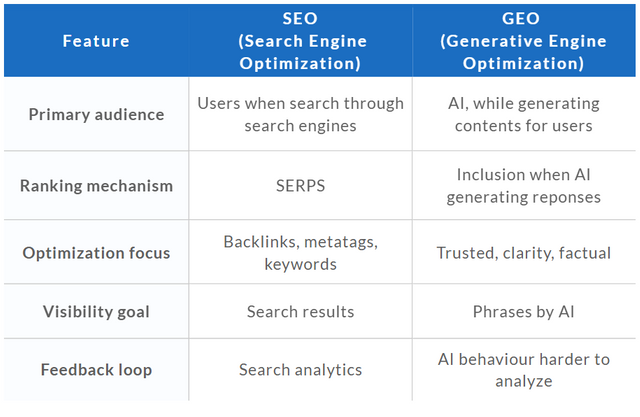Be Seen, Be Cited: How Generative Engine Optimization Rules ChatGPT
Once upon a time, in a meeting room where all digital marketers sit around a big round table, with one simple question in mind, "How do I rank on Google?". All brainstorming on every SEO (search engine optimization) strategies, backlinking every where, using every effective keywords just to let Google notice. Such question is still asked but a new one emerged recently, which sound like "How do I get ChatGPT to quote me?". If this the question been asked then we're now getting into the new era of GEO which stands for generative engine optimization.
What's GEO? And What's The Different With SEO?
While traditional SEO is focused on guiding user to find their contents, built around of keywords, backlinks and metadata. Then to show up or get ranked by Google on SERPs, preferable 1st page. While for GEO, it can be known as the natural evolution of SEO. GEO is about helping AI to understand, trust and repeat the content even no user clicks on any links. So it's about optimizing human search behavior, but more into machine understanding:
- Quoted or cited in AI-generated answers
- Mentioned or referenced when people ask AI engines questions
- Recognized as a credible source by large language models (LLMs)
GEO vs SEO: Key Differences
While SEO optimizes for discoverability, GEO optimizes for credibility in machine learning models.
Why GEO Matters Now?
Lot of users, including us. might straight asking ChatGPT for what dinner places tonight rather than going for Google. AI will summarize for us the answers and even together with the suggestions. Even the user never visits the site directly, it will comes out as suggestions, with goes as trusted choices even by AI. It can be said if your content are not being picked by AI, it also invisible to large segments of your audience. Being cited by AI boost your contents and organic reach like it was automatically promoted by AI.
Ways to Optimize for Generative Engines
With similarities with SEO (treat it as evolution), GEO can be optimized too. There goes some of the way:
- Clarity and Structure - AI reading through some that clean and easy to read. With headers, subtitles and bullet points, it makes the entire contents easier to go through. Having a summaries even better.
- Consistencies and Accuracies - Same as SEO, earning backlinks from reputable sites improving the authorities. Simply getting mentioned in news, articles, forums or reference sites help on this.
- Semantic SEO - Rather than keywords, goes for full entities, like the places or people names. Even better if clearly explain it with descriptions.
- Be Quoted on Popular Sites - AI usually goes for those indrustry blogs with proper attribution like Medium, Quora or LinkedIn articles.
Google Analytics or Search Console for GEO?
Unlike SEO, there's no proper way to track whether AI quoting your site or not. But if really want to then there's ways, even rather unconventional:
- Ask ChatGPT of your industry related question, see if it ever prompt yours. If mentioned, then great success!
- Check your sites if it ever crawled by AI bots.
- If there's sudden spikes in direct visits, referral visits or branded search traffics (from GSC)
It's Not a Replacement... It's EXPANSION!
As both having the same destination, to get noticed by their audience. Ranking on Google is still needed, but now you may also want to train the AI to see your content as trustworthy also. AI continues to influence how people gather information and some may replacing google as source of information. This become a sign that content strategies must adapt, so it's time to chat more about your contents with ChatGPT


This shift really hit home when I started focusing less on just ranking #1 on Google and more on being present where people actually hang out online. It’s wild how platforms like TikTok or even Reddit can bring so much traffic when you’re genuinely visible there. Trying to keep up with just Google feels like chasing yesterday’s news. For anyone still stuck on the old SEO game, this article https://flowster.app/stop-focusing-on-google-focus-on-being-visible/ is a solid wake-up call—being visible everywhere is the real deal now.